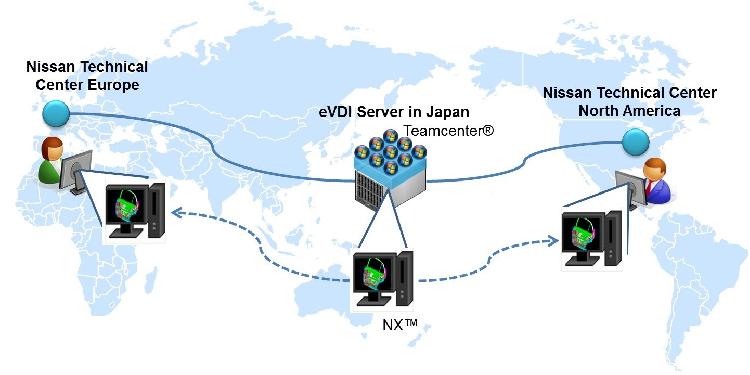
Nissan, Hewlett Packard Enterprise and Siemens Develop Automotive IndustryŌĆÖs First Full-scale Next Generation Vehicle Design Platform
NISSAN MOTOR CO., LTD.’╝łHQ: Yokohama-city, Kanagawa-prefecture, Japan CEO: Carlos Ghosn’╝ē, Hewlett Packard Enterprise ’╝łHQ: Palo Alto, CA U.S.A. CEO’╝ÜMeg Whitman’╝ēand Siemens AG’╝łHQ’╝Ü Munich CEO: Joe Kaeser’╝ētoday announced they have developed the industry’s firstŌĆ╗1 next-generation vehicle design infrastructure that provides Nissan’s global R&D centers with a continuous, high-speed connection to the latest vehicle development data. The solution’s engineering virtual desktop infrastructure (VDI) gives Nissan more flexibility and manageability of global vehicle design. Nissan has started to use the infrastructure in North America and Europe.
Engineering VDI uses advanced graphics processing based on desktop virtualization technology. It allows engineers to access a virtual 3D CAD workstation on servers and control them on a desktop environment. With this technology, Nissan is able to store the latest data on its servers which teams around the world can access at any time. This will enhance productivity and usability, as well as improve cost efficiencies and disaster risk management.
This new platform is a fully-scalable, next generation vehicle design solution that adopts engineering VDI globally, utilizing servers with the most advanced graphics processing, high-performance storage, software and network acceleration technology. Nissan will initially use it at two development centers: NISSAN Technical Center North America and NISSAN Technical Center Europe. With this platform, Nissan expects to experience the same productivity of CAD operations at any global sites, and dramatically decrease costs associated with future system enhancements, version upgrades and operating costs by consolidating and improving infrastructure management. Furthermore, Nissan plans to expand use of the platform in the future, since it has the flexibility to be adopted globally for automobile development.
Hewlett Packard Enterprise (HPE) proposed the innovative end-to-end Engineering VDI solution, including the hardware and software, as well as consulting and support services. HPE assembled project teams across Japan, the United States and Europe to deploy, verify and test the solution. This ensured a smooth implementation and ultimately a flexible, fast and reliable system for Nissan.
The Engineering VDI solution includes the following HPE technology:
- HPE ProLiant WS460c Graphics Server Blades – allows workstation-class high-performance graphics that provides engineers with a centralize, virtualized, full-fidelity desktop experience including support for demanding 3D graphics applications
- HPE 3PAR StoreServ 7400 Storage – allows Nissan to store and manage data from the next generation vehicle design solution on a single, highly scalable and robust Tier-1 storage platform
- HPE Systems Insight Manager – allows easy management of Nissan’s IT infrastructure, increasing system uptime for teams around the world
The solution also utilizes Citrix XenDesktop Desktop Virtualization Technology.
The software technology foundation for Nissan’s Engineering VDI solution was provided by Siemens’ product lifecycle management software business. Siemens’ NX™ software is the core computer-aided design (CAD) solution for Nissan, used throughout the engineering and development of its vehicles. To ensure a high level of VDI performance, NX has been fully certified on all of the hardware necessary to support this system. In addition, Siemens’ Teamcenter® software serves as the digital backbone for Nissan’s VDI solution. Teamcenter® is a comprehensive product data management system that provides easy and rapid access to all product related information to all appropriate personnel, regardless of their location.
NISSAN’s Celso Guiotoko, Chief Information Officer and Global IS/IT said: “With the increasing number of new projects globally, IT’s importance has become even more essential. Based on our global IS/IT strategy, Nissan will focus on linking Management with IT to increase the business value IT delivers for NISSAN.”
HPE is a Nissan global IT partner and is pleased to support Nissan’s VITESSE initiative, which aims to accelerate the company’s growth in the global market.
“Siemens is at the forefront of enabling the digitalization of the global manufacturing industry, and we are proud to work with partners like HPE to help support this important initiative at Nissan,” said Chuck Grindstaff, president & CEO, Siemens PLM Software, a business unit of the Siemens Digital Factory Division. “As a result of Nissan’s drive and initiative, their successful VDI solution serves as a great example for the rest of the global automotive industry and beyond.”
NISSAN will aim to consolidate automobile design development globally to improve productivity and management efficiency.



























